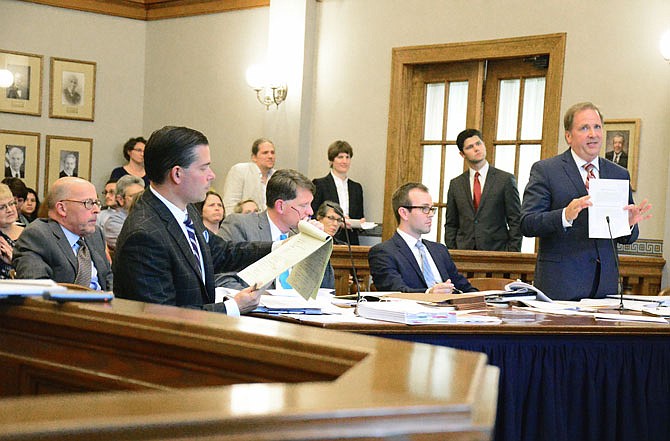After a nearly 90-minute hearing Friday afternoon, Cole County Circuit Judge Dan Green promised to "rule very quickly" on the two lawsuits challenging the proposed Clean Missouri amendment to Missouri's Constitution.
However, he cautioned a gallery full of the amendment's supporters, who came to court to listen to Friday's oral arguments: "Courts do not sit in judgment on the wisdom or folly of these proposals - the court's only function is to ascertain whether the constitutional requirements have been met.
"If I decide in favor of the plaintiffs, that's not a judicial determination that these proposals were bad.
"If I decide in favor of the (secretary of state and the) intervenors, that is not a judicial determination that these are good proposals."
Secretary of State Jay Ashcroft said Aug. 2 the initiative petition proposal received enough signatures to be placed on the Nov. 6 general election ballot.
If voters approve it, the Clean Missouri amendment would create:
A new process and criteria for redrawing state legislative districts during reapportionment.
Changed limits on campaign contributions candidates for the state Legislature can accept from individuals or entities.
A limit on gifts state lawmakers and their employees can accept from paid lobbyists.
A prohibition on state legislators, and their employees, from serving as paid lobbyists for a two-year period after leaving office.
A ban on political fundraising on state property by candidates for, or members of, the state Legislature.
A mandate that legislative records and proceedings be open to the public under Missouri's Sunshine Law.
But two lawsuits challenged the proposed amendment, with both arguing it violates the Constitution's requirement that: "Petitions for constitutional amendments shall not contain more than one amended and revised article of this constitution, or one new article which shall not contain more than one subject and matters properly connected therewith."
Both lawsuits also argued the Clean Missouri initiative petition "makes at least 21 different amendments to the Constitution."
The attorneys for both plaintiffs - Paul Ritter, of St. Elizabeth, and Daniel Mehan, of Jefferson City, who is the president and CEO of the Missouri Chamber of Commerce and Industry - agreed to consolidate their cases for Friday's hearing.
Attorney Eddie Greim, of Kansas City, who filed the Ritter lawsuit just hours after Ashcroft certified the amendment to be on the ballot, detailed several legal arguments for Green to order the amendment off the ballot.
Citing the Missouri Supreme Court's 1990 ruling in "Missourians to Protect the Initiative Process" v. then-Secretary of State Roy Blunt (now a U.S. Senator), Greim reminded Green, "Along with protecting the right of citizens to put things on the ballot, (the Supreme Court) said the people, 'speaking with equal vigor through the same constitution, have placed limitations on the initiative power. That those limitations are mandatory is clear and explicit.'
"In other words, these limitations are there to protect the people."
Greim told Green the main point of the proposed amendment is a change in the way state legislative districts would be drawn.
Instead of "representing geographical communities of interest" as the Constitution now requires, Greim said, "Missouri would try a top-down approach that decides that the General Assembly must be split down the middle between two major parties based not on the popularity of a state legislator or candidate or their positions on state legislative issues but, instead, on the popularity of the major parties' presidential candidates" as well as other statewide races.
But the petition supporters, instead of sticking with that one idea, "could not help themselves" and added ethics reform measures that, Greim said, made their proposal violate the constitutional requirements for a proposed amendment, by "amending more than one article of the Constitution at one time."
Lowell Pearson, a Jefferson City lawyer who filed the Mehan lawsuit, told Green the petition didn't follow technical requirements of the law intended to tell voters what a proposal intends to change.
And Jefferson City lawyer Marc Ellinger, also representing Mehan, cited a 1910 state Supreme Court ruling when he said: "We want to ensure that there is not confusion or uncertainty that comes from fragmented measures."
But Assistant Attorney General Jason Lewis also cited the 1990 Blunt ruling when he told Green: "It is OK to have an incidental effect on other aspects of the Constitution.
"If you look at the proposed amendment here, from a single-subject perspective, it is clear from reading this that the single subject is the Legislature."
While the opponents argued the proposal effectively makes changed in other parts of the Constitution, Lewis noted all of the amendment's provisions list only Article III of the state Constitution, which is the legislative section.
Jefferson City lawyer Chuck Hatfield, representing the group Clean Missouri that circulated the petitions, re-enforced Lewis' argument: "Every provision of this measure was related to the General Assembly (or) had something to effectuate the intent of making changes to the General Assembly (and), more specifically, accountability measures for the Legislature."

